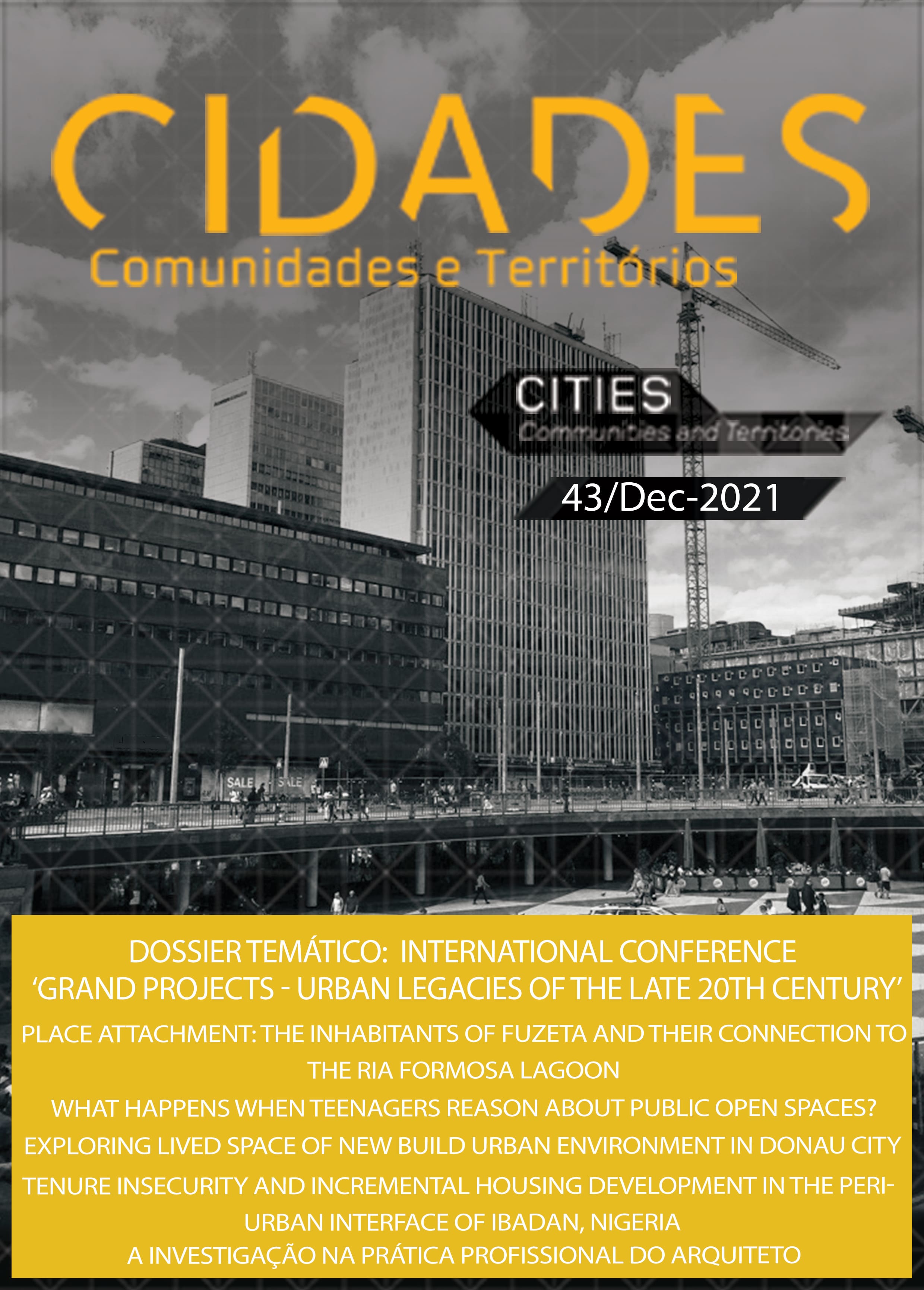Cultural mega-events in heritage-rich cities
Insights from the European Capital of Culture and broader policy perspectives
Keywords:
Cultural mega-events, heritage-rich cities, European Capital of Culture, OlympicsAbstract
The European Capital of Culture (ECoC) is a well-known and long-standing European policy that annually awards the title of Capital to two or more cities that deliver cultural initiatives throughout one year of celebrations. The programme has been hosted by over 60 cities throughout Europe during the last 35 years. Some host cities have used the ECoC to develop large projects that contribute to urban rebranding and regeneration (e.g. the facilities on the new waterfront of Marseille, made for the 2013 ECoC) and, more frequently, projects that adapt existing facilities and places, or smaller scale and less spectacular interventions in the city fabric. As a wide variety of differing cities have hosted the event, the ECoC has contributed to urban transformations at different scales, often with particular reference to historic and heritage-rich settings, but also brings about long-term effects in terms of cultural facilities and venues, tourism appeal and even the intangible heritage narratives attached to places. Drawing on the HOMEE Research Project and on recent publications by the authors, this paper discusses the range of large-to-small-scale planning, the (re)generation of cultural facilities and places in historic cities and heritage-rich areas to accommodate cultural mega-events and the effects they have on host cities over time. In the conclusions, the paper expands beyond the ECoC (in the direction of sport mega-events) to consider and highlight forthcoming challenges for urban policy-making and the planning of mega-events in Europe.
References
Bandarin, F., & Van Oers, R. (2012). The historic urban landscape: managing heritage in an urban century. London: John Wiley & Sons.
Bandarin, F., & Van Oers, R. (Eds., (2015). Reconnecting the City: The Historic Urban Landscape Approach and the Future of Urban Heritage. London: John Wiley & Sons.
Basso, M. (2017). Grandi eventi e politiche urbane: Governare ‘routine eccezionali’ un confronto internazionale. Guerni e Associati.
Beriatos, E., & Gospodini, A. (2004). ‘Glocalising’ urban landscapes: Athens and the 2004 Olympics, Cities, 21(3), 187–202.
Bianchini, F., & Parkinson, M. (Eds., 1993). Cultural policy and urban regeneration: the West European experience. Manchester: Manchester University Press.
Bianchini, F., & Borchi, A. (2018). Il patrimonio nei programmi delle Città e Capitali europee della cultura. Riflessioni su alcuni temi e questioni fondamentali. In Cartaditalia, 2018 Anno europeo del patrimonio culturale. Bruxelles: Istituto Italiano di Cultura, 2017.
Di Vita, S. (2021). Cultural events and heritage policy for the Milan Expo 2015: Experimental intersections between mega-event and city, European Planning Studies, 1–15. https://doi.org/10.1080/09654313.2021.1959723
Di Vita, S., & Wilson, M. (Eds., 2021). Planning and Managing Smaller Events: Downsizing the Urban Spectacle. Abingdon: Routledge.
Dova, E., Sivitanidou, A., Anastasi, N. R., & Tzortzi, J. G.-N. (2021). A mega-event in a small city: Community participation, heritage and scale in the case of Pafos 2017 European Capital of Culture, European Planning Studies, 1–21. https://doi.org/10.1080/09654313.2021.1959721
International Olympic Committee. (2014). Olympic Agenda 2020: 20+ 20 Recommendations. Lausanne: Mimeo.
Gravari-Barbas, M. (2021). Beyond the mega-event: New (?) heritage paradigm for the Olympic games. https://www.youtube.com/watch?v=0EFSKZDpMZA
Jones, Z.M. (2020). Cultural Mega-Events: Opportunities and Risks for Heritage Cities. New York: Routledge.
Jones, Z. M. (2021). Short-term gains and long-term challenges to learning from mega-event planning in the city of Genoa, European Planning Studies, 1–20. https://doi.org/10.1080/09654313.2021.1959720
Jones, Z. M., Ponzini, D. (2018). Mega-events and the preservation of urban heritage: Literature gaps, potential overlaps and a call for further research, Journal of Planning Literature, 33(4), 433–450.
Jones, Z. M., & Ponzini, D. (2021). Umbrellas, Incubators, Mothers and Killers: Four types of relationship between cultural mega-events and small and micro events in Heritage-rich European cities. In S. Di Vita & M. Wilson (Eds.), Downsizing Spectacle: Planning and Managing Smaller (Urban) Events. Abingdon: Routledge, pp. 23-35.
Kassens-Noor, E. (2012). Planning Olympic legacies: Transport dreams and urban realities. Abingdon: Routledge.
Milano Cortina 2026. (2019). Milano Cortina 2026 Candidature Dossier. https://www.milanocortina2026.coni.it/en/files/dossier/28-dossier-english-version.html
Paris 2024. (2018). Paris 2024 presents an optimised Olympic Games venue concept. https://www.paris2024.org/app/uploads/2018/10/press_release_paris_2024_-_update_paris_2024_presents_an_optimised_olymic_games_venue_concept.pdf
Ponzini, D. (2021). Introduction to the special issue – Cultural mega-events and heritage: challenges for European cities, European Planning Studies, ahead of print, 1–10. https://doi.org/10.1080/09654313.2021.1959719
Ponzini, D., Bianchini, F., Tzortzi, N., & Sanetra-Szeliga, J. (Eds., 2020a). Mega-Events and Heritage: The Experience of five European Cities. Krakow: International Cultural Centre.
Ponzini D., Jones Z. M. (Eds. 2021) Charter for Mega-events in Heritage Rich Cities. Krakow: International Cultural Center.
Ponzini, D., Jones, Z. M., Bianchini, F., Tommarchi, E., Tzortzi, N., Dova, E., et al. (2019). HOMEE Literature Review of Mega-events Addressing Cultural Heritage Issues. Retrieved from http://www.tau-lab.polimi.it/homee-literature-review-regarding-mega-events-cultural-heritage/
Ponzini D., Jones Z. M., D'Armento S., Scandiffo A., Bianchini F., Tommarchi, E. (2020b). Urban Heritage and Mega-events: The Case of Matera-Basilicata 2019 European Capital of Culture. Retrieved from http://www.tau-lab.polimi.it/matera-report-file.pdf
Purchla, J. (2021). Heritage and cultural mega-events: backgrounds, approaches and challenges, European Planning Studies, ahead of print, 1–7. https://doi.org/10.1080/09654313.2021.1959727
Sanetra-Szeliga, J. (2021). Culture and heritage as a means to foster quality of life? The case of Wrocław European Capital of Culture 2016, European Planning Studies, ahead of print, 1–20. https://doi.org/10.1080/09654313.2021.1959724
Sanetra-Szeliga, J., Purchla, J., Knaś, P., Kozioł, A., & Dąbrowski, A. (2020). Wrocław 2016, European Capital of Culture. In Ponzini D., Bianchini F., Georgi J.-Tzortzi N., Sanetra–Szeliga J. (Eds.). Mega-events and Heritage: The Experience of five European Cities. Krakow: International Cultural Centre, pp. 102–182.
Tommarchi, E., & Bianchini, F. (2021). A heritage-inspired cultural mega-event in a stigmatized city: Hull UK City of Culture 2017, European Planning Studies, ahead of print, 1–21. https://doi.org/10.1080/09654313.2021.1959722
West, T. (2021). Liverpool’s European Capital of Culture legacy narrative: a selective heritage?, European Planning Studies, 1–20. https://doi.org/10.1080/09654313.2021.1959725
Willems, W. J. H. (2014). The Future of World Heritage and the Emergence of Transnational Heritage Regimes, Heritage & Society, 7(2), 105–120.
Downloads
Published
Issue
Section
License
Copyright (c) 2021 Zachary Mark Jones, Davide Ponzini

This work is licensed under a Creative Commons Attribution-NonCommercial-NoDerivatives 4.0 International License.
CIDADES, Comunidades e Territórios by DINÂMIA'CET-Iscte is licensed under a CC-BY licence.






